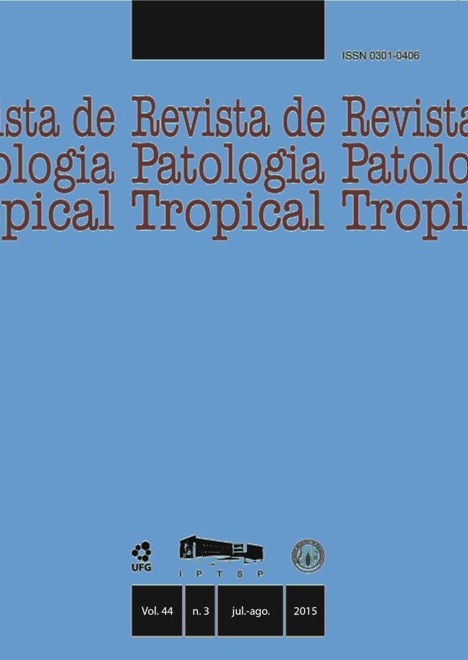ENTEROPARASITOS E COMENSAIS EM ESTUDANTES ENTRE 7 E 14 ANOS EM ÁREAS RURAIS E URBANAS DO MUNICÍPIO DE CAMPOS NOVOS, OESTE DE SANTA CATARINA, BRASIL
DOI:
https://doi.org/10.5216/rpt.v44i3.38024Palavras-chave:
Parasitologia, estudantes, população rural.Resumo
têm contribuído nos problemas sociais e econômicos especialmente em populações de baixa renda, com falta de saneamento básico e higiene. Este trabalho procurou avaliar a ocorrência de parasitos intestinais em estudantes entre 7 a 14 anos de idade residentes de zonas rurais e urbanas do município de Campos Novos, Santa Catarina, Brasil. Um total de 109 amostras foram coletadas, armazenadas em solução SAF, e analisadas pelos métodos de sedimentação espontânea e centrifugo-flutuação. Vinte e quatro (58,5%) e 21 (30,9%) amostras de estudantes da zona rural e urbana, respectivamente, apresentaram parasitos, indicando uma elevada prevalência de parasitos na área rural. Entre os oito diferentes parasitos identificados, ancilostomatídeos (35%) e Ascaris lumbricoides (28.3%) foram os mais abundantes, seguidos de Entamoeba coli (25%), Giardia lamblia (5%), Balantidium coli (1.6%), Iodamoeda sp. (1.6%), Isospora belli (1.6%) e Trichuris trichiura (1.6%). Foi também identificado um caso de poliparasitismo (ancilostomatídeo e A. lumbricoides) em um estudante da zona rural. Também foi identificada uma amostra contendo B. coli que pode indicar a contaminação das fontes de água por dejetos de suíno. Além disso, as condições sanitárias entre as zonas rurais e urbanas são bastante distintas, o que pode estar contribuindo nas diferenças entre o número de estudantes infectados por estes parasitos. Como conclusão, estes dados sugerem uma prevalência mais elevada em estudantes da zona rural e o incremento das condições sanitárias nas áreas rurais se faz necessário para reduzir o parasitismo nesta população.Downloads
Downloads
Publicado
Como Citar
Edição
Seção
Licença
The manuscript submission must be accompanied by a letter signed by all authors stating their full name and email address, confirming that the manuscript or part of it has not been published or is under consideration for publication elsewhere, and agreeing to transfer copyright in all media and formats for Journal of Tropical Pathology.

